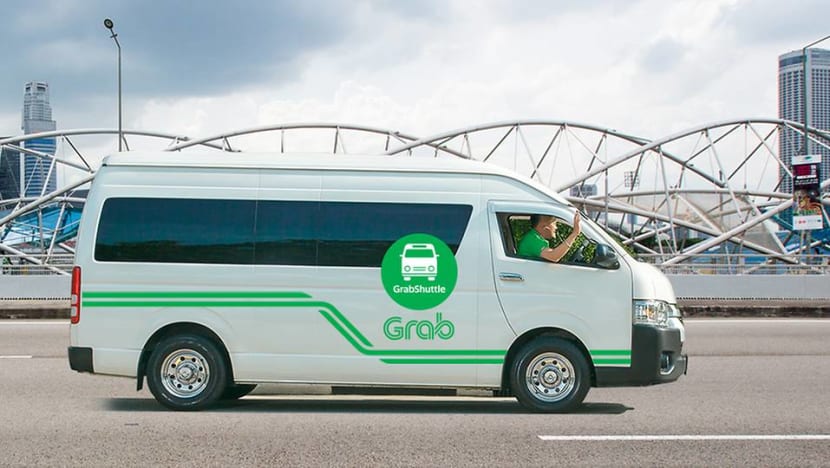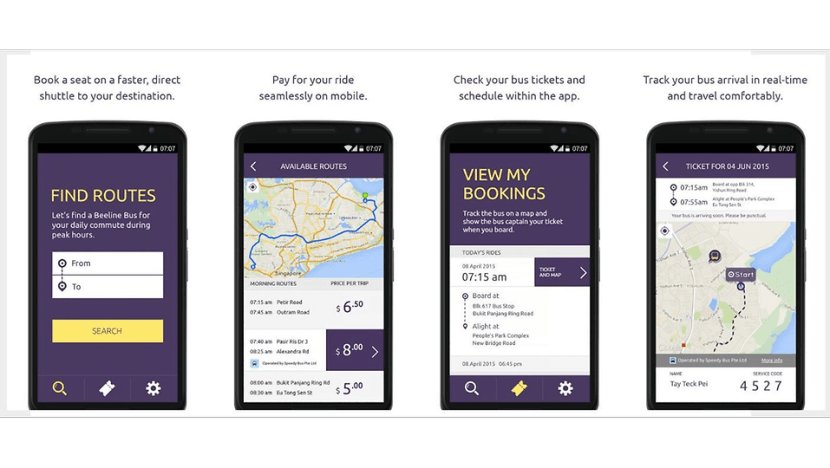On-demand bus services Beeline, GrabShuttle shutting down end-2019

GrabShuttle. (Photo: Grab)
SINGAPORE: On-demand bus services offered by Grab and Beeline will wind down their operations by the end of the year.
In a statement on its website, Beeline - developed in 2015 by the then-Infocomm Development Authority and the Land Transport Authority - said it will cease operations on Jan 1 2020.
Beeline allows commuters to book private bus rides using a mobile app, with its routes determined by crowdsourced suggestions.
In 2017, the service reported having 130 routes and 19,000 monthly bookings.
“This decision will allow us to optimise our efforts and resources on developing products and services that can deliver benefits and convenience to more citizens,” Beeline said in a statement, adding that it had “successfully served a number of Singaporean commuters” for four years.
It noted that Beeline’s code had been made open-source, to allow others to “take advantage of our codebase, building on it to create applications and platforms to help improve first-and-last mile connectivity in Singapore’s transport system.”
Separately ride-hailing giant Grab is also ending operations for both GrabShuttle and GrabShuttle Plus come January.
The two services differ in that GrabShuttle - which is powered by Beeline - operates on fixed-routes and timings.
Meanwhile, GrabShuttle Plus - powered by Canadian technology start-up RideCo - offers dynamic bookings, similar to those of Grab’s ride-hailing offerings.
GrabShuttle Plus operates in areas such as Punggol, Sengkang, Bedok, Tampines and Pasir Ris, as well as routes to and from Kranji Camp II and Sungei Gedong Camp in the west.
These developments come after the LTA ended a six-month trial of on-demand bus services in the Joo Koon and Marina-Downtown areas in June, citing the “high technology costs” associated with offering such services.
REDIRECTING OF RESOURCES
In response to queries from CNA, Grab said the decision to discontinue the services – which it noted were introduced to meet the needs of a niche segment of riders – was unrelated to the shutting down of Beeline.
Instead, it is aimed at allowing the firm to redirect its resources to “further improving our core transport services to better serve our customers,” said a spokesman for the Singapore-based firm.
Grab declined to give ridership figures for either GrabShuttle or GrabShuttle Plus, but noted its GrabCoach service – which allows users to charter buses for up to 40 people – will continue.
CNA has contacted the Government Technology Agency (GovTech) for comment on Beeline's decision to stop offering on demand buses.
Services like GrabShuttle may not have been well-utilised and thus not financially viable for a private enterprise like Grab, said Singapore University of Social Sciences transport economist Walter Theseira.
He added that operating a successful transit service is difficult to do so profitably, noting it requires both reliable demand and customers who are willing to pay.
“On-demand services are (especially) hard because you need the demand to be just so. Too little demand, they're better off taking taxis. Too much demand, (there should just be) a regular bus service.”

NOT ALL DOOM AND GLOOM FOR ON-DEMAND BUSES
On-demand bus services exist in various cities worldwide, with varying degrees of success.
Kutsuplus, which began operating in Helsinki in 2013, ended operations after two years as the authorities deemed it too costly.
And in January Chariot, - which operated in various US cities and was owned by carmaker Ford - announced it was closing shop.
However, local start-up SWAT - part of the Goldbell engineering and transport group – says it still sees a future for on-demand bus services.
The firm has existing projects in Singapore, Australia, and Vietnam, and is expected to begin operations in Indonesia, The Philippines, Japan and China in the coming months.
SWAT was one of two firms participating in the LTA's on-demand bus trial, with the other being United States-based Via.
“With increasing congestion due to rapid urbanisation and infrastructure limitations, we believe that on-demand ride-pooling in buses is the way of the future,” said SWAT chief executive and co-founder Jarrold Ong.
He added that such services can provide efficient public transport in areas where traditional fixed bus routes are not viable.
The most successful roll-outs have been in providing first-and-last mile connections to train, metro and trunk bus lines, he noted.
Mr Ong noted that while SWAT’s primary focus is on working with governments to provide its services as part of public transport, as well as with companies for employee transport arrangements, it is also exploring other areas such as the use of autonomous vehicles.














